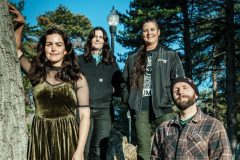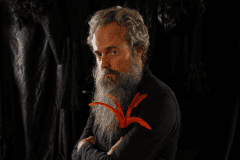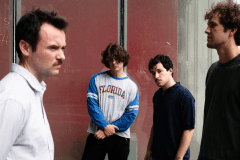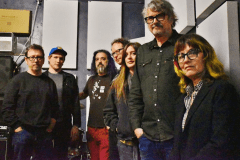From The Horse's Mouth: Martin Dosh (Dosh) on Milk Money
With the flash and efficiency of digital song-making technologies, it can be easy to lose sight of the merits of that which is analog. Martin Dosh has become something of an accidental preservationist, keeping instruments like Rhodes keyboards and an ancient Korg EX 800 sequencer alive by using them in his innovative solo works and collaborations with the likes of Andrew Bird and Bonnie “Prince” Billy.
Blending elements of hip hop, jazz, vocal samples and electronic production, he builds a variety of warm soundscapes on his latest release, Milk Money, which sees release on October 22 via Graveface Records & Curiosities.
Ghettoblaster recently caught up with Dosh to discuss his release. This is what he told us about it.
When did you begin writing the material for your most recent album?
I think the first piece was constructed in late 2011, I spent a large chunk of 2012 on the road with Andrew Bird, so this record was a bit more of a slow build than my earlier efforts.
What was the most difficult song to take from the initial writing stage through recording and mixing? Why was it so troublesome?
Well, for me, recording and writing are the same thing. All of the songs are built off of a simple idea, almost always improvised. I record constantly, and then try to follow through and build off these relatively simple concepts, if I can listen back a few days later and deem the germ of the song worthy.
For me the hardest song to wrangle was probably “Legos”, which is the last song on the record. It’s also the longest song I’ve ever released, I think it’s around 24 minutes. I was asked to compose a song for me and Glenn Kotche to perform in early 2013, and the demo that I sent him in late 2012 was the basis for the version that’s on the record. I actually wanted it to be a little longer on the record, maybe I’ll do an extended remix of it someday.
I think it was just hard to be patient in listening to it so many times in the editing and mixing stages, hard to make sure it built up in a satisfying way. It’s dedicated to my dad, so I’m trying to convey what it feels like to be his kid in this song without words, if that makes any sense.
Which of the songs on the record is most different from your original concept for the song?
Since the conception of all the songs occurs through improvisation and not through sitting at a piano trying to come up with a chord progression or melody, this is kind of a moot point. However, I would say the song “Death Set”evolved more than any of the others as I added more percussion to it. I thought it was going to be more four-on the floor when I wrote the synth arpeggios, but then as I started stacking percussion on it, it developed a more West African kind of vibe, at least as far as the drums go.
I think that’s one of the most fun things about the way I do things, and most frustrating: not knowing where you’re gonna end up when you start. It’s fun when it works.
Did you have any guest musicians play or sing on the record?
I did. Aby Wolf, Maggie Morrison and David Huckfelt came to my house for one day last summer, we set up four mics and we all improvised vocals over about 10 songs. I think we did two passes. Editing and re-sampling them took a lot of time, but it was a great “library” to work from.
Who produced the record? What input did that person have that changed the face of the record?
I produced it myself, with some great help from my often-partners-in-crime, Mike Lewis, Jeremy Ylvisaker, Tom Herbers and Ben Durrant.
Mike had toured with me since 2006, and was an integral part of the Dosh sound to this point, playing sax, keys and bass on “The Lost Take”, “Wolves and Wishes”, and “Tommy”. He joined Bon Iver in 2011 and Dosh reverted back to a solo endeavor. However, he helped me mix the record, and had a lot of good suggestions, especially for the mixing of “Legos”.
Jeremy and Tom helped me to re-amp the record, sending out all the tracks simultaneously through a room full of guitar amps and re-recording them at the same time. That genuinely changed the sonic impact of all the songs.
And Ben helped me mix it. He has mixed every one of my records.
Is there an overarching concept behind your new album that ties the record together?
The theme is solitude. Originally I had wanted to do everything on the record by myself, which is a departure for someone who’s such a natural collaborator. All my other records are stacked with guitars, violins, basses, saxes; things I can’t play played by friends who can do it better. I figured this record would just sound different if I did it alone. Of course, that changed when I added the vocals, but that was the initial impulse.
Have you begun playing these songs live and which songs have elicited the strongest reaction from your fans?
I’ve played most of them live at least once. Playing “Legos” with Glenn at the Walker Art Center in Minneapolis was probably the highlight so far. I hope we get a chance to do it again!








Social Media